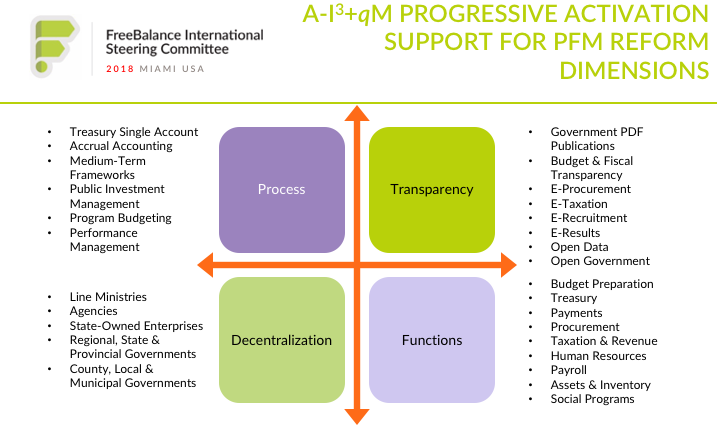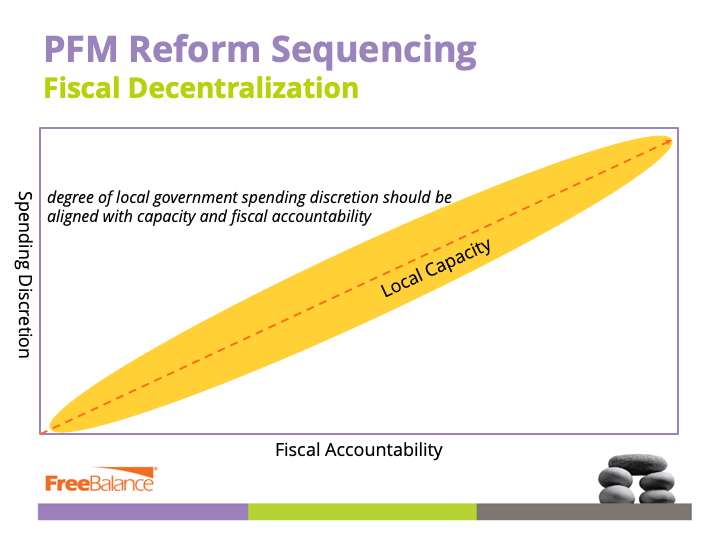Improve Public Finance Effectiveness through Fiscal Decentralization
Government operational and fiscal decentralization leads to improved local decision-making and service delivery. This is particularly important considering the extent of public service expenditures in regional and local governments. Many countries struggle to achieve the benefits of decentralization, delegation, and devolution.
- Challenges include accountability, capacity, coordination, discretion, technology, and variability.
Background: our experience in Kosovo, Liberia, Mongolia, Sierra Leone, Sri Lanka and Timor-Leste demonstrates the need to decentralize based on country context
Why it matters: fiscal decentralization improves:
- Service delivery
- Infrastructure development
- Decision-making
These improvements depend on the governance quality of decentralized agencies in national governments and Sub National Governments (SNGs). Governance improvements are associated with SNGs accountability and financial rules integration with national governments.
By the Numbers
- In OECD countries Subnational governments account for 40% of public expenditure, corresponding to 16% of GDP, a proportion that has increased in recent decades for most countries“
- In all countries: SNGs account for around one-quarter of total government spending on average, or 9% of GDP. Subnational spending shares are particularly high, exceeding 35% of government spending and 15% of GDP in most federations but also in some unitary countries
- Service delivery is critical for SNGs: The bulk of SNG spending is on education, general public services and social protection
Misconceptions about implementing fiscal decentralization include:
- Give local or regional governments very simple solutions, even Excel-based, because there is insufficient human capacity
- Limit budget planning and commitment accounting functionality, also because of insufficient human capacity
- Decentralization is only a local and regional government concern, and does not relate to national governments

Decentralization is 1 of 4 progressive activation themes for PFM reform
[progressive activation & discretion/accountability diagrams]
How does FreeBalance help fiscal decentralization?
- Progressively activate functionality enhancements based on improving capacity
- Configure software to support unique decentralization requirements, rather than code customization
- Coordinate standardization for the consolidation of national accounts, decision-making information, and goals via the adaptable Chart of Accounts and Chart of Goals
- Enable all revenue and expenditure sources, not just budgets provided via the national government to provide comprehensive Public Financial Management (PFM) at all levels of government
- Adapt the discretion and accountability mix in line with reform and capacity building

Effective fiscal decentralization requires balancing discretion with accountability in line with capacity improvements
- Increasing civil service accountability without enabling local decision making creates perverse incentives – as does providing local decision making discretion without accountability
What is different about how FreeBalance supports fiscal decentralization?
- Technology: unified postmodern open system supporting national and subnational integration
- Deployment: supports public and private cloud, shared services, VSAT (Mongolia and Nunavut), batch updating via dial-up and encrypted memory sticks for poor connectivity
- Configuration: use of no-code/low-code approaches as primary method for adaptation supports progressive activation making fiscal decentralization reform over time sustainable
- Autonomy: local government control and legal discretion preserved
Reality check: fiscal decentralization varies among countries, and within countries
- Federal and unitary government types, with some countries having special economic zones and indigenous governance zones
- State-Owned Enterprise footprint and the extent to privatization and process outsourcing
- Urban and rural governance concerns and capabilities
Examples from FreeBalance government customers include:
- Mongolia implemented the FreeBalance Accountability Suite with decentralization and capacity in mind
- Phase 1: central government
- Phase 2: UlaanBaatar aimag (municipality) and soums (regions)
- Phase 3: all aimags
- Kosovo progressively activated over time beginning with the UN Mandate, taken over by the government
- Phase 1: expenditure controls and cheque printing
- Phase 2: accounting
- Phase 3: ministerial decentralization of common functions.
- Phase 4: regional and local government
- Phase 5: budget transfer decentralization
- Phase 6: upgrade to Version 7 of the FreeBalance Accountability Suite that is massively configurable to support future reform
- Timor-Leste fiscal decentralization included integrating program classifications at the national and local level to track progress
Most FreeBalance implementations have multiple decentralization phases in national government implementations:
- Phase 1: Ministry of Finance and 1 or more major Ministries
- Phase 2: All Ministries
- Phase 3: All agencies
The FreeBalance Accountability Suite has also been leveraged to support other forms of legal reform in concert with fiscal decentralization such as:
- Migration to accrual accounting
- Development of more advanced audit
- Program budgeting, Medium-Term Expenditure Frameworks, and performance management
- Fiscal transparency and transparency portals
The bottom line is that fiscal decentralization is effective when aligned to country needs:
- Adapts to constitutional and capacity constraints
- Supports available bandwidth
- Enables the entire budget cycle
How does fiscal decentralization improve service delivery?
- Supports decisions and discretion by public servants who understand the local context
- Provide s public servants with financial information to improve decisions across the budget cycle
An alternative view is that fiscal decentralization is an avenue for corruption. That’s why it makes sense to use commercial software, like the FreeBalance Accountability Suite, with:
- Robust expenditure and segregation of duties control
- Fully auditable transactions
- Automated processes to eliminate many points of corruption
- Data integrity and encryption to trap attempts to manipulate data
- Password challenge and other techniques to enforce segregation of duties
- Automated fiscal transparency support
In other words, government fiscal decentralization includes:
- Progressively activation of functionality to local and regional governments in line with capacity improvements and legal reform
- Optimization of the full budget cycle beyond accounting
- Inclusion of decentralization to line ministries, agencies, and State-Owned Enterprises
